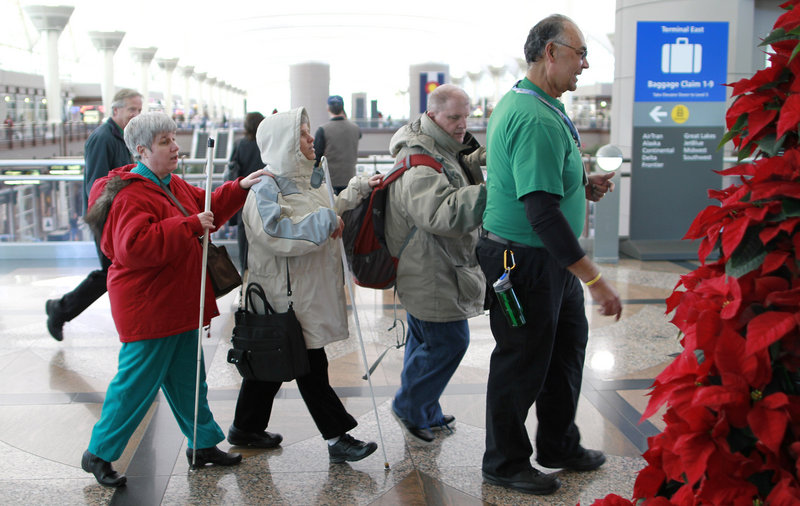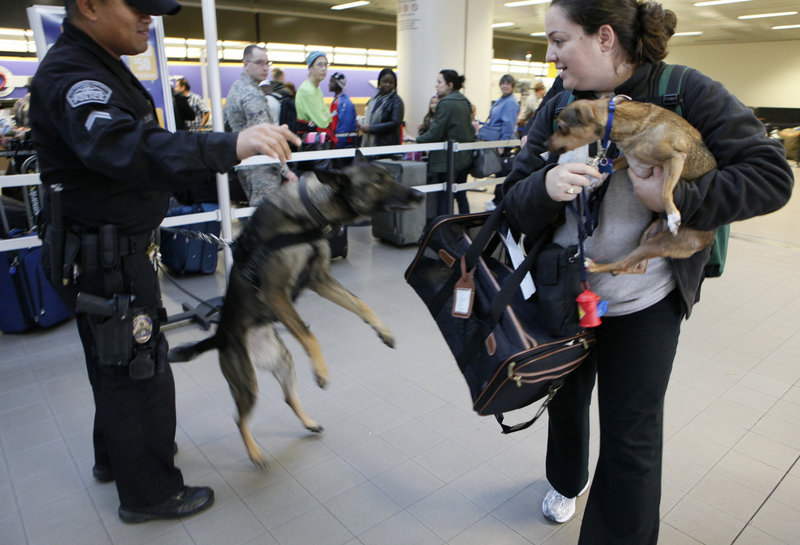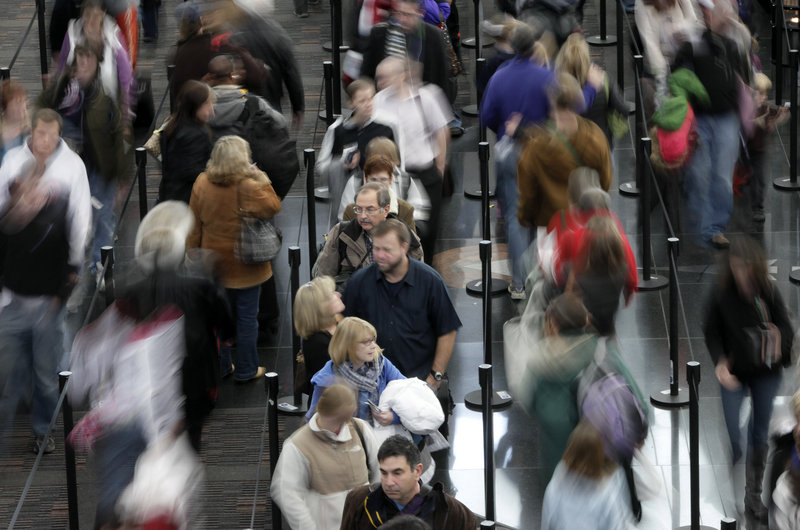NEW YORK – Explosive snow globes? You’ve got to be kidding, Robyn Burford thought when security inspectors at the Portland, Ore., airport demanded she hand over her two glitter-filled souvenirs.
The snow globes might contain explosive nitroglycerin, an officer informed the 16-year-old from Houston. Instead of complaining, Burford did what thousands of other travelers are doing when confronted with pat-downs, body scanners and the other indignities of air travel this holiday season.
She bit her tongue and obeyed.
“I think we’re actually getting used to the fact that we have to go through so much to go places,” Burford said.
As the Christmas travel week arrives, it appears Americans are getting used to flying under the specter of terrorism and the new inconveniences the government deems necessary to combat it. Most people surrender to body scans and invasive pat-downs with little fuss. Resignation has replaced fear.
Even when the Newark, N.J. airport, one of the country’s biggest, closed a terminal containing a “suspicious package” Monday, most travelers shrugged off the two-hour disruption.
Holiday air travel is up 2.8 percent this year, says the AAA motorists’ club, which surveys Americans about their travel plans. That’s about the same as the increase in the number of people who are driving.
The numbers suggest that U.S. travelers are undeterred by airport security measures introduced after a Nigerian was arrested on charges of trying to blow up a Detroit-bound airliner on Christmas Day 2009 with explosives hidden in his underwear.
The Transportation Security Administration has installed 483 full-body image scanners at 78 airports, and plans to have 1,000 in place by the end of 2011. In late October, the agency announced a new, more invasive pat-down procedure in which inspectors touch the inside of passengers’ legs, the groin area and along the buttocks.
Outrage over the screenings grew in November. Hundreds of thousands of people viewed a cell-phone video in which a California man resisted a scan and groin check at the San Diego airport with the words, “If you touch my junk, I’ll have you arrested.”
REACTIONS VARIED
Some travelers tried to organize a boycott of the body scanners ahead of Thanksgiving, but the movement fizzled, said Airports Council International-North America, which represents airport managers. There were no signs of a revolt this time, either, the group said.
A Washington Post-ABC News poll last month found that 64 percent of Americans support the use of body scanners. The random telephone poll of 514 people had a margin of error of 5 percentage points.
Lucas Wiseman got the pat-down treatment for the first time this week in Dallas and said it was “a little over the top, a little invasive.”
“It felt more like a rubdown than a pat-down, to be honest,” said Wiseman, 32. He said he understands the need for security — but that next time he’ll ask for the frisking to be done in a private room instead of in front of other passengers.
Others are less bothered by the measures.
“If it means me getting naked, I’ll get naked and get right on the plane,” said Gil Torres, 49, as he waited at Chicago’s O’Hare International for a flight to the Philippines.
Shama Chopra, a Montreal woman who was on the Christmas flight with the Nigerian suspect, is now so concerned about safety that she and her husband, Raman Chopra, avoid flying together. They take separate flights to keep their children from turning into “instant orphans” if something happened, Raman Chopra said.
A FEW CHOOSE ALTERNATIVES
Aside from the screening measures, the TSA says it is using bomb-sniffing dogs, explosive detectors and “behavior detection officers” trained in spotting suspicious travelers. The agency’s Secure Flight Program compares passenger manifests with government databases to spot possible attackers before they even arrive at the airport.
The complications have deterred at least some of the 92.3 million people traveling over the holidays from taking a plane. Mike Higgins of Oklahoma City said long security lines and air travel delays are part of the reason he and his wife are driving 1,100 miles to Las Vegas for Christmas.
“It’s less hassle,” said Higgins. “I’d rather have the freedom of driving.”
But those who have switched from air to car travel because of security are in the minority, AAA spokeswoman Nancy White said. There has been no “significant hike” in motorists because of airport security or fears of a terrorist attack, she said.
Chris Soulia, the president of the American Federation of Government Employees Local 1234, a union that represents 1,800 TSA agents in several Western states, said officers are seeing more cooperation from passengers in recent months.
“The passengers are getting used to the new screening procedures, probably because we’ve had so much coverage in the press,” he said. He added that people haven’t made a fuss about the imaging machines.
“A lot of people who come through, their standard response is, ‘That’s it? That’s what all the fuss is about?’” he said.
One hiccup Soulia noted: wrapped presents. Agents must unwrap them if they have to screen a bag.
WIN SOME, LOSE SOME
Once on board, air travelers appear to be behaving themselves.
Many passengers said they have learned to get to the airport earlier to deal with security delays. Cynthia Jordan, 24, flies about twice each year from Columbia, S.C., to Detroit and typically arrives at airports two hours before her flight takes off.
“No problems. It bothers me that you have to take off so much stuff,” she said. “But it’s a safe way to keep everything in good hands.”
There are still plenty of eye-rolling moments, however.
After relinquishing her two $6.95 snow globes, Burford discovered that the same snow globes were on sale at a gift shop beyond the security checkpoint.
She replaced them — at a cost of $11.95 each.
Send questions/comments to the editors.





Success. Please wait for the page to reload. If the page does not reload within 5 seconds, please refresh the page.
Enter your email and password to access comments.
Hi, to comment on stories you must . This profile is in addition to your subscription and website login.
Already have a commenting profile? .
Invalid username/password.
Please check your email to confirm and complete your registration.
Only subscribers are eligible to post comments. Please subscribe or login first for digital access. Here’s why.
Use the form below to reset your password. When you've submitted your account email, we will send an email with a reset code.